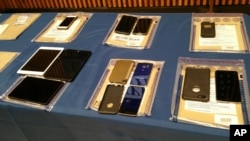The U.S. Justice Department is asking a judge to immediately compel Apple to comply with a court order for the company to unlock the iPhone used by one of the gunmen in last year's San Bernardino attack in California.
In the motion, filed Friday, prosecutors offered a sharp response to the public statement by Apple’s chief, Tim Cook, who said the firm would challenge the court order to protect his customers' privacy.
"Rather than assist the effort to fully investigate a deadly terrorist attack ... Apple has responded by publicly repudiating that order," prosecutors wrote.
Prosecutors said that Apple's refusal to help unlock the phone for the government "appears to be based on its concern for its business model and public brand marketing strategy."
"The order does not, as Apple's public statement alleges, require Apple to create or provide a 'backdoor' to every iPhone," prosecutors added.
Apple argues the software the Federal Bureau of Investigation is seeking would effectively act as a so-called "back door" that could be used to weaken the iPhone's security measures.
A new hearing in the case is set for March 22, according to Friday's motion. Apple's lawyers are expected to file their formal response to this week's court order by the end of next week.
Apple strengthened encryption of its phones in 2014 amid increased public concern about digital privacy. The government has complained in the past that the higher security measures make criminal and national-security investigations more difficult.
Apple's CEO said in an open letter Wednesday that the company has no sympathy for terrorists and was outraged by the attack carried out in San Bernardino, California, in December by American-born Syed Rizwan Farook and his wife, Tashfeen Malik, a native of Pakistan. The attack left 14 people dead.
Cook said it has given the FBI any relevant data it possesses, complied with all legal subpoenas and search warrants, and has offered its engineers' advice to federal investigators.
"While we believe the FBI's intentions are good, it would be wrong for the government to force us to build a backdoor into our products. And ultimately, we fear that this demand would undermine the very freedoms and liberty our government is meant to protect," Cook wrote.
The court order issued Tuesday gives Apple the option of providing the government with alternative ways to access Farook's phone, as long as the methods bypass the auto-erase feature that automatically erases all data on an iPhone when invalid passwords are entered multiple times. This would allow the FBI to guess passwords until it could penetrate the encrypted data.
The government also stipulated that Apple's "backdoor" should ensure that no other software on iPhones would delay repeated password guesses.
With a new tool to bypass the auto-erase function, the FBI would be able eventually to unlock Farook's phone, which investigators believe would yield text messages, logs of telephone calls and web browsing data.




